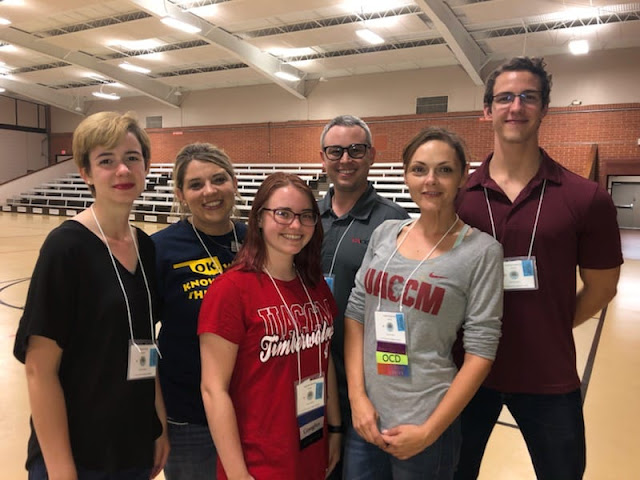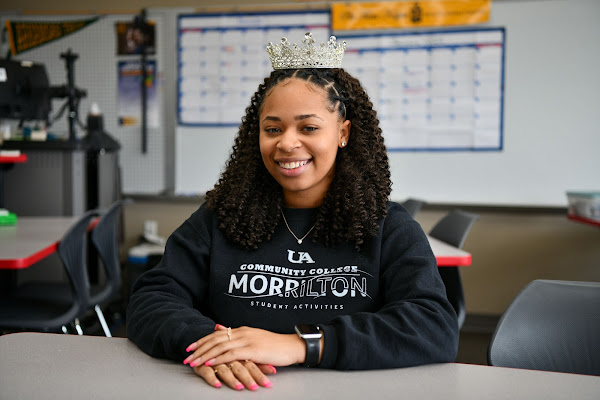PTK Students Share Experiences from Convention
 |
| Members of PTK at the Phi Theta Kappa Oklahoma-Arkansas Regional Convention. Courtesy of Mathew Herrman. |
Sarah Fulmer
The most useless thing I have learned from my two extemporaneous speech competitions is that my brain is utterly hopeless at doing anxiety.
When Mr. Herrman first brought up the idea of having me compete at the Phi
Theta Kappa Oklahoma-Arkansas Regional Convention (that’s a mouthful, isn’t
it?), I was too excited to realize how terrified I should have been. Even when
he explained to me how the completion would work, I was still too giddy to realize
how terrified I should be.
The extemporaneous speech competition at PTK conferences
works like this: the competitors blindly draw a topic (chosen by the
competition coordinator) related to current events and the present PTK
emphasis. A faculty advisor in the room starts the clock. Competitors now have
their cell phone, three note cards, and 25 minutes to prepare a three-to-five
minute speech that will be given to a panel of three judges. Oh, the audience
will also contain the full hundred or so teachers, students, and alumni present
at the conference.
Now I was terrified. I wondered if I was going to throw up
and seriously considered just dropping out. Who was I to compete against two
people who had been giving speeches all weekend, much less someone who did the
“Almighty, Sure-to-Make-You-Amazing” speech and debate?
Thankfully, I remembered my teacher was sitting in the
audience and that more than being humiliated in a speech, I did not want to
endure a five-hour car ride back to Arkansas with him if I pulled out. When it
was my turn to choose a topic, I walked up the table and took a piece of paper.
Now I knew I was going to throw up.
Address the right of incarcerated persons to request
religious exemptions or accommodations.
I’m sorry, what? My knowledge of the religious exemptions of
prisoners was nill. NPR had not done a piece on this topic!
But my time had started, so I dropped into my chair and
pulled out my phone.
Participating in Model United Nations and Model Arab League
during high school and college has taught me skills in a variety of areas. One
of the best things I’ve learned is how to research. In Model UN, you’re
assigned a country and a committee. Each committee has a set of topics for
writing a position paper. These topics are normally insanely long. I had
learned the hard way that just pasting the topic into Google wouldn’t help me.
Over the course of my high school years, I learned how to pick apart the
various aspects of a topic in order to do better research.
So, that afternoon, I spent about ten minutes searching
phrases like “religious exemptions in prisons,” “rights of prisoners to request
exemptions,” and “reasons prisoner requests are denied.” After I had a general
idea of the topic, I shifted to organizing my speech. I settled on three simple
points: kinds of requests, issues with accommodation, and solutions to those issues.
During the last five minutes, I mumbled under my breath what
I would call a pathetic attempt at a rehearsal. Too soon, my time was up, and
someone was ushering me out of the room and into the auditorium. The stage felt
massive. I had been instructed to start as soon as I reached the podium, so, like
the rule-obsessed person I am, I placed my note card on the podium so it
wouldn't shake with my hands, looked out across the audience, and jumped into
my hook. I was doing my best to make eye contact with the judges, which is how
I noticed Mr. Herrman’s dramatic gesture to stop
talking.
I broke off in the middle of a word. Eventually, I learned I
had been sent onstage too early; the judges hadn’t finished scoring the last
speaker. I was mortified. After what felt like an eternity, I got the go-ahead
and started again. Four minutes and fifty-nine seconds later, I walked off
stage. Five hours after that, I listened to Dr. Robinette announce the winners
of my competition.
We had to get something from the car, and it was probably 20
degrees outside. I was freezing, ready to go back to the relative warmth of the
building, nervous and tense from left-over adrenaline, and terrified by the
fact that up to this point, Mr. Herrman had said exactly zero words about my
speech. In fact, once the competitions were over and our group was sitting in
the lobby, he actually came over to us, picked up an empty chair, and walked
away without a word. So, yes, terrified is not an exaggeration. I am a
recovering people-pleaser. This was torture.
But then, as we tried to shove bags back into the van’s
poorly mislabeled “trunk,” he finally,
finally, broke the silence. A large part of me had decided I probably would
rather him not say anything. I’m still learning to accept criticism well, and
at that moment in my life, my speech was my child, and I thought Mr. Herrman
was about to call it ugly. Instead, we got the hatch shut. On the way back
inside, he said,
“I am incredibly proud of you.”
Back to the also-cold ballroom. Even as I waited for the
winners to be called, even as I hoped for second place, I had already shifted
to being giddy. My overarching goal for this speech competition had been to
make sure I didn’t embarrass the school, my fellow students, and most
importantly, my teacher. In that respect, I was relaxed. It was one checkbox I
could mark through with a Sharpie.
Then I realized two people were already standing on the
stage with awards, and my name hadn’t been called yet. I’m not sure who cried
more when I came back to our table with my first-place plaque. I hate to admit it,
but I didn’t stop looking at it for at least a week.
Amy Gericke
The first activity that we went to was a class where they went over a slideshow and did a couple different activities. The slideshow included various topics like active listening, leadership approaches, handling conflict, and goal setting. We had a few activities and packets of information like The Lifeboat and The Secrets of Great Groups. The most interesting part of The Lifeboat activity was the fact that you had to choose eight people to go on the lifeboat and your choices were you and 12 other people. Many of the people within the group chose not to participate in the activity, because it was too difficult.Another thing that we did was the breakout sessions. We went into the sessions to discuss each presentation that we got to sit through. The group that I was in discussed various topics. It was very interesting what everyone had to say and I felt honored to be able to be a part of the discussions that we had. Some of the topics that were covered where politics, religion; mental disorders, like anxiety and depression; and life struggles, like parenting and other jobs. Everyone in the group was non-argumentative, intelligent, knowledgeable, and highly professional on how they presented themselves. Which is how it should be when topics and opinions are discussed.
The main event of the regional honors Institute was the speech competition. The speeches were highly interesting. There were a couple different topics based off of one main idea and every speech had its own component of originality. The prepared speeches were very interesting in how they were all given so differently. I mostly enjoyed the extemporaneous speech that was given. It was so empowering to see someone bring together so little knowledge about a topic and add research and prepare a speech over the topics, and on top of that, that is only allowed to be done in such a small time frame. They were given twenty minutes from the time they were given the topic until the start time of their speech. I was very happy to know that both of the students from our school, UACCM, got first place in both categories.
The most impactful event of the weekend, in my opinion, was the Because I Said I Would presentation. We got to hear from the founder of the organization about what it was all about. The movement that was started from one small action was so impactful it turned into an overnight sensation. It was so inspiring and emotional. Because I Said I Would cards were given to everyone at the event and there was a banner created with the cards from everyone at the institute.
The Regional Honors Institute was full of amazing activities and group discussions. The weekend was full of inspiring messages and fun learning opportunities. I could not have asked for a greater opportunity. I feel it is one of the best things I have attended outside of on-campus activities; this was definitely different than anything that could be offered on-campus. I am honored to be a member of such a prestigious group. Phi Theta Kappa has given me amazing opportunities I would not have been able to take part in otherwise.
Michael Grant
This was my first event to travel to with PTK, hence I was not sure what to expect aside from a speech competition. Overall, the conference was a wonderful learning opportunity and bonding experience for the group from UACCM that went, as well as for making connections to the larger PTK community. Our chapter had ample opportunity to interact outside of purely academic reasons. The more I got to know the advisors and fellow chapter leaders and members, the more I liked them.Regarding the event, arriving early on Friday was a positive. We immediately went to the pre-conference leadership academy and engaged in critical thinking exercises and team building games. We had an interactive seminar over what it means to be a leader and the different approaches required in different environments. The most enjoyable and challenging part was a discussion and activity on ethics. We concluded with setting goals for life with deadlines.
The first, and following, general sessions had a great mix of education, fun, and comradery. My second favorite part of the conference was the keynote speaker, Alex Sheen. His “Because I Said I Would” message was strong and moving. In essence, it is an encouragement to have accountability in self-betterment and to keep promises. After the general session we broke up into more intimate small groups and had deeper a conversation about what the keynote speaker’s message meant to us. The group I was in was extremely open and accepting. Many people shared difficult experiences and received support. Later seminars were a big help in figuring out how a future PTK project works. The process was explained, and the following Q&A cleared everything up.
I got to see how big PTK is in our region alone, meet and learn from other leaders and advisors, compete and gain experience in public speaking, and forge amazing memories with advisors and acquaintances who became friends.



Comments
Post a Comment
Thoughts on this blog entry? Bring 'em on!